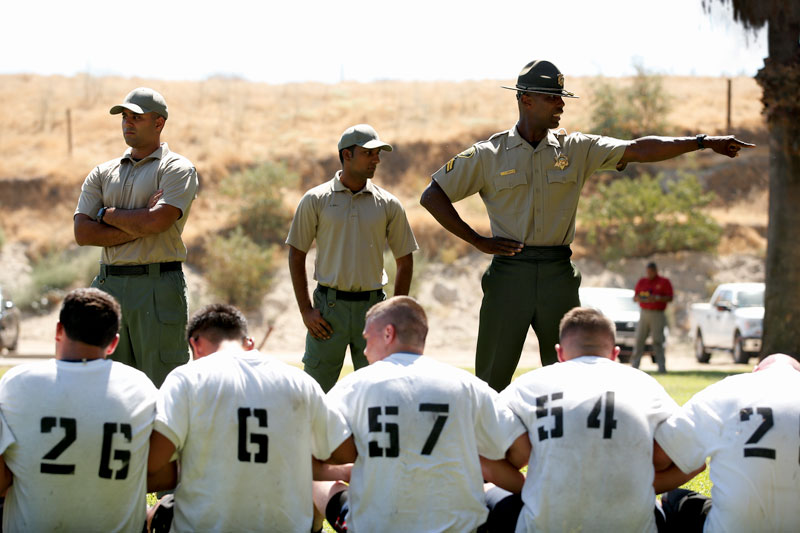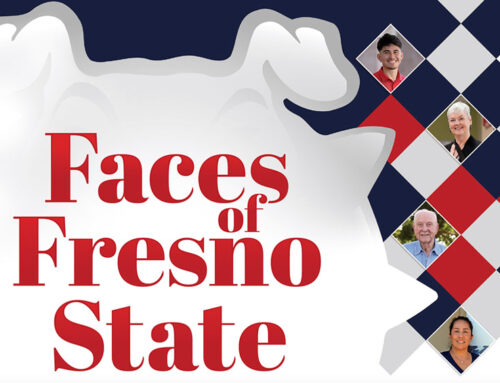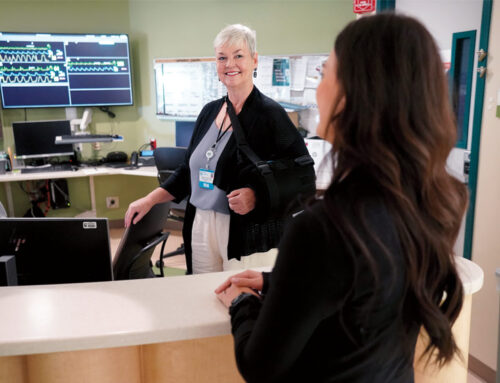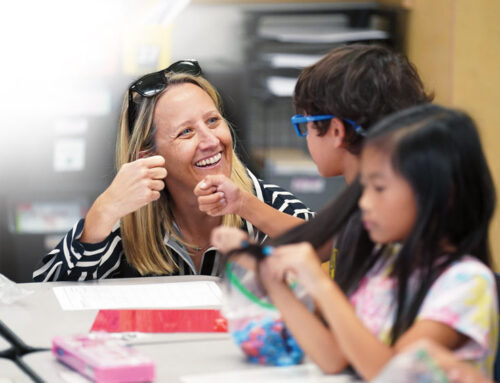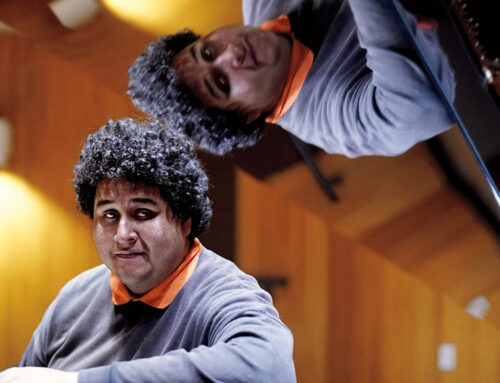Beyond the Badge
How a one-of-a-kind criminology program challenges and prepares generations of law-enforcement officers
By Eddie Hughes | Photos by Cary Edmondson
Anamarie Serrano remembers her first time in a patrol car. She was 6 years old and crying. It was the worst day of her life.
She sat in the front seat next to her brother as an officer showed them all the buttons and how to turn on the flashing lights. It was the best distraction he could think of to ease the children’s minds while other officers were inside their Stockton home arresting their father after a domestic dispute with their mother.
Seventeen years later, Serrano has been in a patrol car hundreds of times. Now, she sits behind the wheel, firearm on her hip and badge adorning the shirt of her uniform. She doesn’t wear her emotions on her sleeve — she wears the emblem of the Fresno County Sheriff’s Office.
Many officers say they were attracted to law enforcement by a desire to keep their communities safer, clean up the streets or put criminals away. Deputy Sheriff Serrano was inspired by something more personal — her own childhood.
“The way I see it, when we get a call for service, we’re not getting a call from someone who’s having the best day of their life,” Serrano says. “They’re calling us to solve their problems. For me, it’s not cleaning up the streets, it’s cleaning up someone’s life.”
Now 22 years old, Serrano is one of the youngest solo officers on the beat. She graduated from Fresno State in May 2018 after completing the Criminology 108 program, a University partnership with the Fresno County Sheriff’s Office that provides police training and on-the-job experience while students are pursuing their bachelor’s degrees.
On a rainy March ride-along during her overnight patrol shift covering much of Fresno and parts of Clovis, Serrano opened up about the challenges she faced as a youngster — but not without a little prodding.
She started with the day her life changed, in 2002, after the domestic dispute. Her father was deported to Mexico, she says, leaving her mother alone to care for Serrano and her three siblings. But by 2004, with her mother battling addiction, Serrano says she and her siblings entered the foster care system. She recalls being placed in 10 foster homes and starting to fall behind in school. But by age 8, she was placed in a permanent foster home and started to thrive.
“Being a kid, you’re constantly changing environments when you’re within foster care,” Serrano says, “so you can sink to whatever level, versus deciding that you want to do something better for yourself. It all comes down to circumstance and who you want to be, and I learned that early on.”
Perhaps that mentality is what got Serrano through her toughest days training to be an officer. As part of the Criminology 108 program, students go through what’s known as “Day 1, Hour 1,” a boot camp-style physical training designed to test the limits of their mental toughness and gauge how dedicated they are to being part of the program.
At lunch time that first day — in what Serrano described as adding a basic training element to school — she considered quitting. She toughed out the rest of the day and went home and asked herself, “Do I even want to do this? Do I want to be a cop?” The program is designed to show who wants it bad enough, to make students answer those tough questions for themselves — and Serrano left no doubt with her training officers.
To them, she stood out from the beginning. Serrano was chosen as squad leader for the first month and a half of the program, and then was named class sergeant when the group began firearm training.
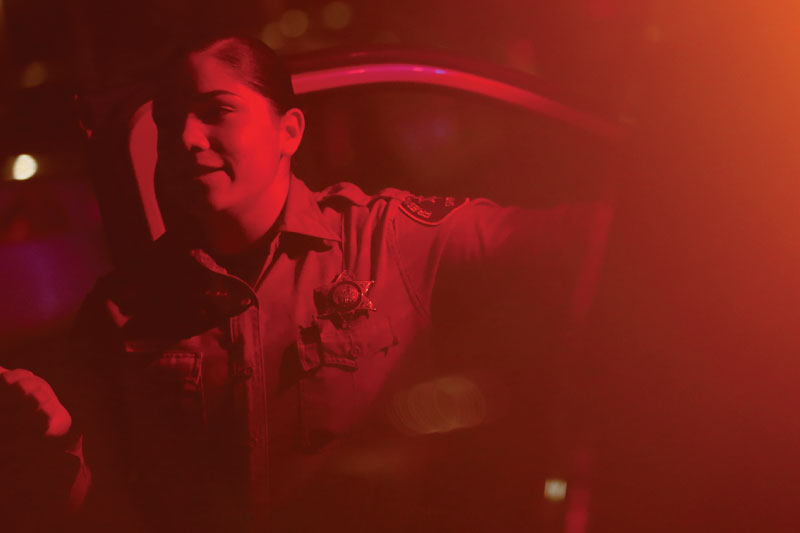
“She is the perfect example of someone who really went through some of life’s trials
and tribulations and made the best of her situation and took responsibility for herself.”
LIEUTENANT RYAN HUSHAW
Fresno County Sheriff’s Office
“She was a very good student, focused, quiet,” says Neil Dadian, the course instructor who also serves as Kingsburg chief of police and is retired from the Fresno County Sheriff’s Office. “I didn’t know her situation until we had a chance to have a one-on-one conversation. She told me some of her struggles, which really made me have a lot of respect for her and what she had accomplished.”
Fresno County Sheriff’s Office Lieutenant Ryan Hushaw says “she is the perfect example of someone who really went through some of life’s trials and tribulations and made the best of her situation and took responsibility for herself.”
How does it feel to overcome so much, to navigate through adult problems
as a young child and come out as a successful college graduate wearing a badge? Sitting in her patrol car, Serrano tilts her head toward her shoulder, smiles and pauses as if she’d never before taken the time to appreciate her success.
“It feels empowering that you’re being your own hero,” Serrano says. “You didn’t fall victim to circumstance. It’s nice to be able to go to a call and see that person having their worst day, but you’re solving the issue … It’s very empowering to be that person now for someone else.”
On the job, Serrano is professional, quick to respond and slow to cast judgment. During the ride-along, she encountered everything from simple traffic stops to a suspicious vehicle parked in a neighborhood with two young, self-proclaimed gang members and drug paraphernalia inside.
She assesses each situation as if she’s been an officer for years — a testament to the on-the-job training she got alongside veteran cops while she was a student at Fresno State. As she approaches the drivers of each vehicle she pulls over, she’s direct with her questioning, but also shows empathy — like with the driver who wasn’t properly displaying her license plate and was traveling home from a long night of work. “She has compassion and can apply that compassion out in the field,” Dadian says.
Serrano is still young, just starting out in her career. The educators and officers she has trained under, many of them Criminology 108 alumni themselves, like Dadian and Hushaw, agree she shows tremendous promise.
Deputy Sheriff Serrano has already accomplished a lot — maybe more than the statistics suggest someone with her challenging background should. But she keeps checking off her goals. Fresno State graduate, check. Criminology 108 program, check. Deputy sheriff, check. Eventually, she’d like to serve on the crisis negotiation and SWAT teams.
But first, she’ll continue to prove herself. Just like she has done her whole life.
“My calling is to make a difference in the world,” Serrano says. “I know as a law-enforcement officer I’m not going to be able to save everyone, but if, on a single day, a person is experiencing the worst day of their lives, I hope to be the aid that keeps their hope alive.”
— Eddie Hughes is the senior editor for Fresno State Magazine.
Top Prospects
Criminology 108 program feeds the recruitment needs of Fresno County Sheriff’s Office
On the wall of Lieutenant Ryan Hushaw’s office at a downtown Fresno sheriff’s substation are class photos from the past several years of Criminology 108 students at Fresno State. Each student’s photo is circled, marked or crossed out to signify their progress and whether they’ve been hired as officers or moved on to other career paths.
In the business world it’s called measuring ROI, or return on investment. The Fresno County Sheriff’s Office has invested in this partnership with the University for more than 50 years, relying on the program to prepare future officers while they pursue their college degrees — as opposed to the traditional police academy.
Like a NFL team’s general manager preparing for the draft, Hushaw and the training officers scout Criminology 108 students during their two years in the program, ready to recruit the standouts of the class and hire as many as they can. The rest often go on to other law-enforcement agencies locally or across the United States, or pursue related fields like counseling or probation.
No other university in the California State University system offers a program like Criminology 108, and it is believed to be the only program of its kind in the nation. The Fresno County Sheriff’s Office counts Crim 108 alumni, or “108s” as they’re known, all throughout its ranks.
“It’s a very intensive, hands-on program,” says Hushaw, a former 108 himself. “We compare it to something similar to an ROTC program where you’re really learning the job and actually performing the job.” Students endure physical training and learn firearm, baton and defensive tactics. They learn about their legal authority as officers, how to work with the public and how to defuse situations.
DAY 1, HOUR 1
THE PROGRAM REGIMEN DESIGNED TO TEST MENTAL TOUGHNESS TYPICALLY LOSES A THIRD OF ITS STUDENTS IN THE FIRST HOUR OF TRAINING
120 HOURS
ON PATROL PER SEMESTER UNDER THE SUPERVISION OF EXPERIENCED OFFICERS
Typically, students enter the program during their junior years at Fresno State. Classes meet on Wednesdays and training takes place Saturdays. By their senior years, they have been hired as reserve deputies, earned their Criminology 108 badges and are carrying firearms while they log 120 hours on patrol per semester under the supervision of experienced officers. Once they graduate from the University, they complete field training and then can apply to become solo deputy sheriff officers.
The process takes dedication, and mental and physical toughness while sacrificing some of the social outings other college students enjoy. But for students who know they want to go into law enforcement, it’s a valuable way to gain experience and earn a well-paying job upon graduation.
“If you’re a criminology major and you want to be a police officer in California or even anywhere in the United States, this is the program for you,” says Karanvir Singh Jhawer, a reserve deputy sheriff who is preparing to graduate from Fresno State and apply for a full-time job. “You finish most of the academy in school while you’re getting your degree. The second portion of the program is invaluable. You get to go out there on patrol, they let you drive, they let you make the arrest, they let you put the handcuffs on suspects. It’s on-the-job training while you’re in college.”
Jhawer hasn’t always known he wanted to be an officer. But he knew he wanted to choose a career that allowed him to give back to his community. He was born and raised in Clovis after his father, Lakhvir, moved the family from India to the United States in 1985.
“He basically had nothing when he came here,” Jhawer says, “and he started his own business with a family friend and built it from the ground up. In 1990, he got his own house in Clovis, which we still live in.”
Jhawer says when he and his brother started at Viking Elementary School in Fresno, they were the only Punjabi kids on the campus. He didn’t know English when he started school and remembers one specific instance in kindergarten when his teacher was repeatedly telling him to “pay attention” while he had no idea what she meant.
Today, one would never know Jhawer had ever faced a language barrier. He graduated from Clovis West High School and went on to Clovis Community College, where he thought about pursuing a career in the medical field. Then he took a criminology class from Garry Elliot, a former deputy sheriff whose passion for law enforcement inspired Jhawer. Elliot put him in touch with Neil Dadian, the Kingsburg chief of police who has been teaching Criminology 108 for seven years.
Jhawer transferred to Fresno State and excelled in the program, including the boot camp-style physical training known as “Day 1, Hour 1” that is designed to test the cadets’ mental toughness. Jhawer served as squad leader and was later chosen by his peers to receive the Leadership Award at the program’s pinning ceremony.
“Our lives are so much better here than they probably would have been in India,” Jhawer says. “The schooling that we’ve gotten, the education, the opportunities that we have, the friends and all the memories that we have from living here. Why wouldn’t I want to give back?”
This past summer, he served as a reserve deputy on the boating enforcement unit at Pine Flat Lake, and he says the discipline and responsibility he’s learned through Criminology 108 have carried over into other areas of his life.
“I knew I always wanted to help the community. For the longest time, I didn’t know how I wanted to do that, but being a peace officer in California would be my dream come true.”
KARANVIR SINGH JHAWER
Reserve Deputy Sheriff
“Before, I wasn’t really structured,” Jhawer says. “People say I talk differently, I present myself differently, I walk differently. I don’t notice it but my family does and some of my friends do.”
The professional demeanor he carries himself with is critical on the job. And he learned that on his first ride-along. “I remember my first day on patrol,” Jhawer says. “We pulled our guns out three or four times, just in one night. That’s when I knew, oh, this is real. This isn’t a game. This isn’t an internship. This is work. This is real life.”
As Jhawer nears graduation and continues to learn, he hopes he’s on track to earning a job as a full-time deputy sheriff. He wants his photo to be one of those circled on the wall inside Hushaw’s office. Jhawer says that would be his way of giving back to the community that’s given him this opportunity.
“I knew I always wanted to help the community,” Jhawer says. “For the longest time, I didn’t know how I wanted to do that, but being a peace officer in California would be my dream come true.”

